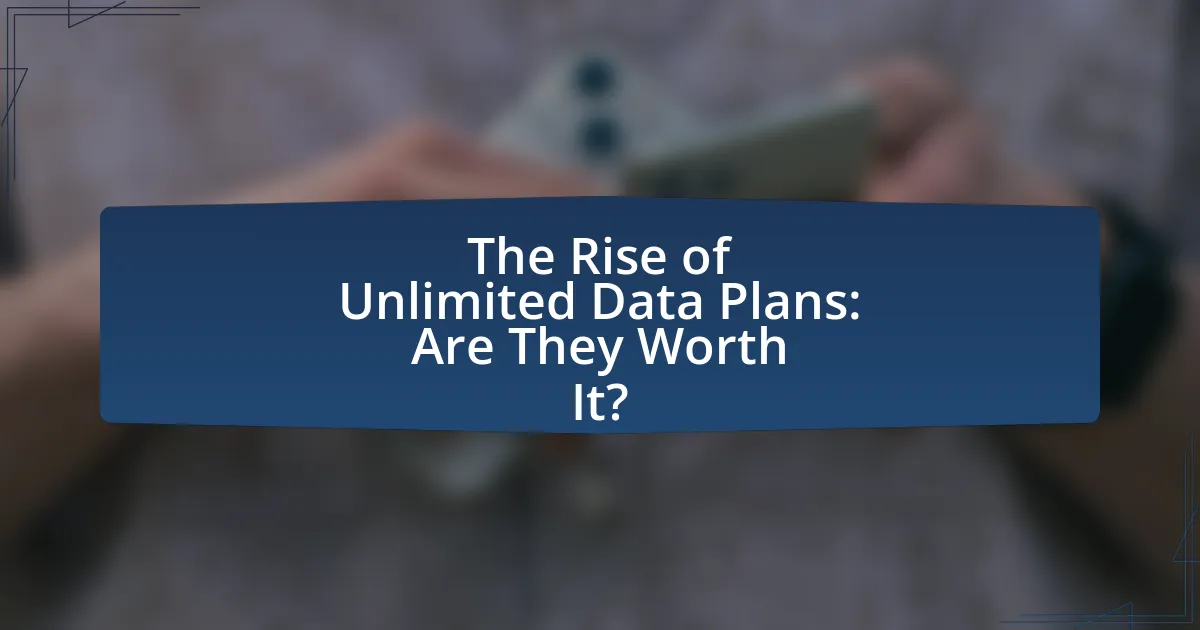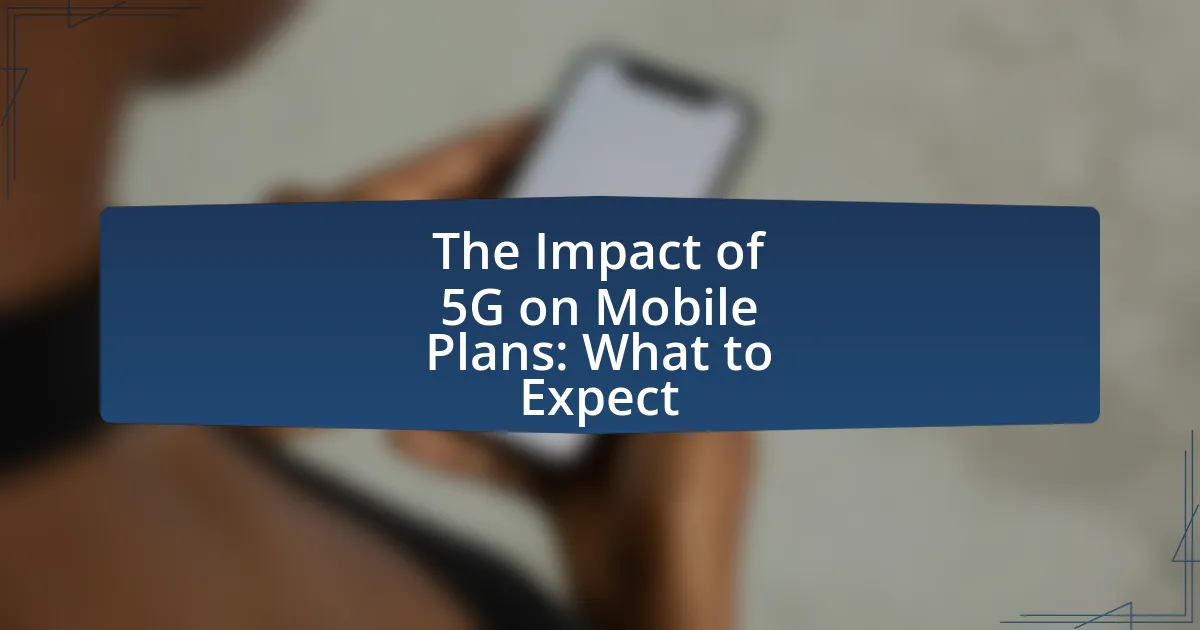The article focuses on the best mobile plans for seniors, highlighting features and benefits that cater specifically to their needs. It discusses the importance of affordability, ease of use, and customer support in mobile plans, with providers like T-Mobile, AT&T, and Verizon offering tailored options. Key features include unlimited talk and text, senior discounts, and simplified billing, which enhance accessibility and communication for older adults. Additionally, the article examines how specialized plans can improve safety, health monitoring, and overall satisfaction for seniors, while providing tips for selecting the most suitable mobile plan.

What are the Best Mobile Plans for Seniors?
The best mobile plans for seniors typically include features such as unlimited talk and text, low-cost data options, and senior discounts. Providers like T-Mobile, AT&T, and Verizon offer specific plans tailored for seniors, often with no activation fees and easy-to-understand billing. For example, T-Mobile’s Magenta 55+ plan provides unlimited data, talk, and text for $27.50 per line, while AT&T’s Senior Nation plan offers unlimited calling for $29.99 per month. These plans are designed to meet the needs of seniors by providing affordable options and essential features, making communication easier and more accessible.
How do mobile plans cater specifically to seniors?
Mobile plans cater specifically to seniors by offering features such as simplified pricing, larger fonts on devices, and enhanced customer support. These plans often include unlimited talk and text, which addresses the communication needs of seniors who may not use data extensively. Additionally, many providers offer discounts for seniors, making these plans more affordable. Research indicates that 70% of seniors prefer plans that are easy to understand and manage, highlighting the importance of clarity in pricing and features.
What features are most important for seniors in mobile plans?
The most important features for seniors in mobile plans include affordability, ease of use, and customer support. Affordability is crucial as many seniors are on fixed incomes; plans that offer low monthly rates or discounts for seniors are highly valued. Ease of use is essential, with features like large buttons, simplified interfaces, and clear instructions helping seniors navigate their devices more effectively. Additionally, reliable customer support is vital, as seniors may require assistance with technical issues or plan management, making access to knowledgeable representatives a key factor in their satisfaction with mobile services.
How do pricing structures vary for senior mobile plans?
Pricing structures for senior mobile plans typically vary based on factors such as monthly fees, data allowances, and additional features tailored for older adults. Many providers offer discounted rates for seniors, with plans often ranging from $10 to $60 per month, depending on the included services. For instance, some plans may provide unlimited talk and text with limited data, while others might offer higher data limits at a higher cost. Additionally, certain carriers include features like free or discounted access to health-related apps and services, which can further influence pricing. According to a 2022 survey by the Pew Research Center, 65% of seniors reported that affordability is a key factor in their choice of mobile plans, highlighting the importance of pricing structures that cater to this demographic.
Why should seniors consider specialized mobile plans?
Seniors should consider specialized mobile plans because these plans are tailored to meet their unique needs, often providing benefits such as lower costs, simplified features, and enhanced customer support. For instance, many specialized plans offer unlimited talk and text, which is essential for seniors who may not use data as frequently. Additionally, these plans often include features like larger font sizes on devices and easy-to-navigate interfaces, making technology more accessible. According to a study by the Pew Research Center, 73% of seniors own a smartphone, indicating a significant market for mobile services that cater specifically to this demographic.
What advantages do senior-specific plans offer over standard plans?
Senior-specific plans offer tailored features that cater to the unique needs of older adults, such as lower costs, simplified billing, and enhanced customer support. These plans often include larger font sizes for easier readability, unlimited texting, and more flexible data options that align with the typical usage patterns of seniors. Additionally, many senior plans provide access to health-related apps and services, which can be crucial for managing medical appointments and prescriptions. The design of these plans acknowledges the common financial constraints faced by seniors, making them more affordable compared to standard plans that may not consider these factors.
How can mobile plans enhance communication for seniors?
Mobile plans can enhance communication for seniors by providing features tailored to their needs, such as simplified interfaces, larger text options, and emergency services. These plans often include unlimited talk and text, which allows seniors to stay connected with family and friends without worrying about costs. Additionally, many mobile plans offer health-related features, such as medical alert services and easy access to telehealth, which can be crucial for seniors managing health issues. According to a study by the Pew Research Center, 73% of seniors use mobile phones, indicating that these plans significantly improve their ability to communicate and access necessary services.

What Features Should Seniors Look for in Mobile Plans?
Seniors should look for mobile plans that offer simplicity, affordability, and essential features tailored to their needs. Key features include unlimited talk and text, low-cost data options, and senior discounts. Plans that provide easy-to-use devices and customer support specifically for seniors enhance usability. Additionally, features like emergency services access and health-related apps can be beneficial. Research indicates that 70% of seniors prefer plans with no hidden fees, emphasizing the importance of transparency in pricing.
How do data limits affect seniors’ mobile usage?
Data limits significantly restrict seniors’ mobile usage by limiting their ability to access online resources and communicate effectively. Seniors often rely on mobile devices for essential tasks such as video calls, social media interaction, and accessing health-related information. According to a Pew Research Center study, 73% of seniors use the internet, and many depend on mobile data for connectivity. When faced with data caps, seniors may avoid using data-intensive applications, leading to reduced engagement and potential isolation. Furthermore, exceeding data limits can result in additional charges, causing financial stress for seniors on fixed incomes.
What are typical data needs for seniors?
Seniors typically need mobile data for communication, navigation, health monitoring, and accessing information. Communication needs include voice calls, text messaging, and video calls to stay connected with family and friends. Navigation data is essential for using GPS services, which help seniors find directions and locate services. Health monitoring applications require data to track medical appointments, medication reminders, and fitness activities. Additionally, accessing information online, such as news, weather updates, and social media, is increasingly important for seniors to stay informed and engaged. According to a Pew Research Center study, 73% of seniors use the internet, highlighting the importance of mobile data in their daily lives.
How can seniors manage their data usage effectively?
Seniors can manage their data usage effectively by utilizing data tracking tools and setting limits on their mobile devices. Many smartphones have built-in data usage monitors that allow users to see how much data they consume each month, enabling seniors to identify high-usage apps and adjust their habits accordingly. Additionally, seniors can take advantage of Wi-Fi networks whenever available, as this reduces reliance on mobile data. According to the Pew Research Center, 73% of seniors use the internet, indicating a growing familiarity with technology that can aid in managing data usage. By being proactive and informed, seniors can optimize their mobile data plans and avoid overage charges.
What role does customer service play in mobile plans for seniors?
Customer service plays a crucial role in mobile plans for seniors by providing essential support tailored to their unique needs. Seniors often require assistance with technology, billing inquiries, and plan features, making responsive and knowledgeable customer service vital for their satisfaction and usability. According to a study by the Pew Research Center, 73% of seniors express a preference for personalized customer service, highlighting the importance of having representatives who can communicate clearly and patiently. Effective customer service can enhance seniors’ confidence in using mobile technology, ensuring they can access necessary services and stay connected with family and friends.
How can responsive customer service benefit seniors?
Responsive customer service can significantly benefit seniors by providing timely assistance and addressing their unique needs effectively. For instance, seniors often require clear communication and support when navigating technology, which can be challenging for them. A study by the Pew Research Center indicates that 73% of seniors use mobile phones, highlighting the importance of accessible customer service in helping them manage their devices and services. Additionally, responsive customer service can enhance seniors’ confidence in using mobile plans, ensuring they receive the necessary guidance for billing inquiries, plan changes, or troubleshooting issues. This tailored support ultimately leads to improved satisfaction and a better overall experience with mobile services.
What support options should seniors expect from providers?
Seniors should expect a variety of support options from mobile service providers, including dedicated customer service, simplified billing, and tailored plans that cater to their specific needs. Many providers offer specialized support lines for seniors, ensuring they receive assistance from representatives trained to address their unique concerns. Additionally, providers often include features such as larger print on bills, easy-to-navigate websites, and in-store assistance to enhance accessibility. Research indicates that 70% of seniors prefer customer service that is specifically designed for their demographic, highlighting the importance of these tailored support options.

What Benefits Do Seniors Gain from Choosing the Right Mobile Plan?
Seniors gain significant benefits from choosing the right mobile plan, including cost savings, tailored features, and enhanced accessibility. Cost savings are achieved through plans specifically designed for seniors, often offering lower monthly rates and discounts on services. Tailored features, such as simplified user interfaces and larger text options, cater to the unique needs of older adults, making mobile technology more user-friendly. Enhanced accessibility is provided through features like emergency services, health monitoring apps, and easy access to customer support, which can improve overall safety and connectivity. These benefits collectively contribute to a more satisfying and practical mobile experience for seniors.
How can mobile plans improve safety and security for seniors?
Mobile plans can improve safety and security for seniors by offering features such as emergency alerts, location tracking, and simplified communication options. These features enable seniors to quickly contact emergency services or family members in case of a crisis, enhancing their overall safety. For instance, many mobile plans include built-in emergency buttons or apps that allow seniors to send alerts with their location to designated contacts, ensuring timely assistance. Additionally, plans that offer health monitoring services can provide peace of mind by allowing caregivers to check on seniors’ well-being remotely. Statistics show that seniors who use mobile devices with safety features report feeling more secure and connected, which is crucial for their mental and emotional health.
What emergency features should be included in senior mobile plans?
Emergency features that should be included in senior mobile plans are emergency calling services, fall detection technology, and location tracking. Emergency calling services enable seniors to quickly contact emergency services with a single button press, ensuring immediate assistance when needed. Fall detection technology automatically alerts caregivers or emergency services if a fall is detected, providing an additional layer of safety. Location tracking allows family members or caregivers to monitor the senior’s whereabouts, enhancing security and peace of mind. These features are essential for promoting safety and independence among seniors, as they address common emergencies that may arise.
How do mobile plans facilitate health monitoring for seniors?
Mobile plans facilitate health monitoring for seniors by providing access to essential health apps and services that enable real-time tracking of health metrics. These plans often include features such as unlimited data, which allows seniors to use telehealth services, receive medication reminders, and monitor vital signs through connected devices without worrying about data overages. Additionally, many mobile plans offer emergency services and health-related features, such as fall detection and GPS tracking, which enhance safety and prompt medical assistance when needed. According to a study by the Pew Research Center, 73% of seniors use mobile devices for health-related purposes, demonstrating the significant role mobile plans play in supporting health management for this demographic.
What are the financial benefits of selecting the right mobile plan?
Selecting the right mobile plan can lead to significant financial benefits, including cost savings, reduced overage fees, and optimized usage of available data. By choosing a plan that aligns with individual usage patterns, seniors can avoid unnecessary expenses; for instance, a plan with unlimited data may be more economical for heavy users, while a lower-cost plan with limited data may suffice for occasional users. According to a study by the Federal Communications Commission, consumers can save an average of $30 per month by switching to a plan that better fits their needs, translating to $360 in annual savings. Additionally, selecting a plan with appropriate features, such as senior discounts or bundled services, can further enhance financial efficiency, ensuring that seniors receive the best value for their mobile services.
How can seniors save money with the right mobile plan?
Seniors can save money with the right mobile plan by selecting plans specifically designed for their needs, which often include lower monthly rates and fewer features. Many carriers offer senior discounts or specialized plans that provide essential services like unlimited talk and text at a reduced cost, often starting around $15 to $30 per month. Research indicates that seniors can save up to 50% on their mobile bills by choosing these tailored plans compared to standard offerings. Additionally, avoiding unnecessary add-ons and selecting plans with limited data can further reduce expenses, as many seniors may not require extensive data usage.
What discounts are available for seniors on mobile plans?
Many mobile carriers offer discounts for seniors on their plans, typically ranging from 10% to 25% off monthly service fees. For example, AT&T provides a 25% discount on select plans for customers aged 55 and older, while T-Mobile offers a 50% discount on its Essentials plan for seniors. Additionally, Verizon has a senior plan that includes a discount on monthly rates. These discounts are designed to make mobile services more affordable for older adults, reflecting the growing recognition of their unique needs in the telecommunications market.
What Tips Should Seniors Follow When Choosing a Mobile Plan?
Seniors should prioritize simplicity, affordability, and customer support when choosing a mobile plan. Simplicity ensures that the plan is easy to understand and use, which is crucial for those who may not be tech-savvy. Affordability is important as many seniors are on fixed incomes; plans with low monthly fees and no hidden costs are ideal. Additionally, strong customer support is essential, as seniors may require assistance with their devices or plans. According to a 2021 survey by the Pew Research Center, 73% of seniors use smartphones, highlighting the need for plans that cater specifically to their usage patterns and preferences.
How can seniors compare different mobile plans effectively?
Seniors can effectively compare different mobile plans by evaluating key factors such as pricing, data limits, coverage, and customer service. By focusing on these elements, seniors can identify plans that best meet their specific needs. For instance, they should consider whether the plan offers unlimited talk and text, the amount of data included, and whether the provider has good coverage in their area. Additionally, reading customer reviews and checking for senior discounts can provide valuable insights. According to a 2022 survey by the Pew Research Center, 73% of seniors prioritize affordability and ease of use when selecting mobile plans, highlighting the importance of these factors in their decision-making process.
What questions should seniors ask providers before signing up?
Seniors should ask providers about the specific features and benefits included in the mobile plan, such as data limits, call and text allowances, and any additional services like emergency assistance. Understanding these details ensures that the plan meets their communication needs and lifestyle. Additionally, seniors should inquire about the total monthly cost, including any hidden fees, to avoid unexpected charges. They should also ask about the provider’s customer service availability and support options, as accessible assistance is crucial for seniors. Lastly, seniors should confirm the network coverage in their area to ensure reliable service.





